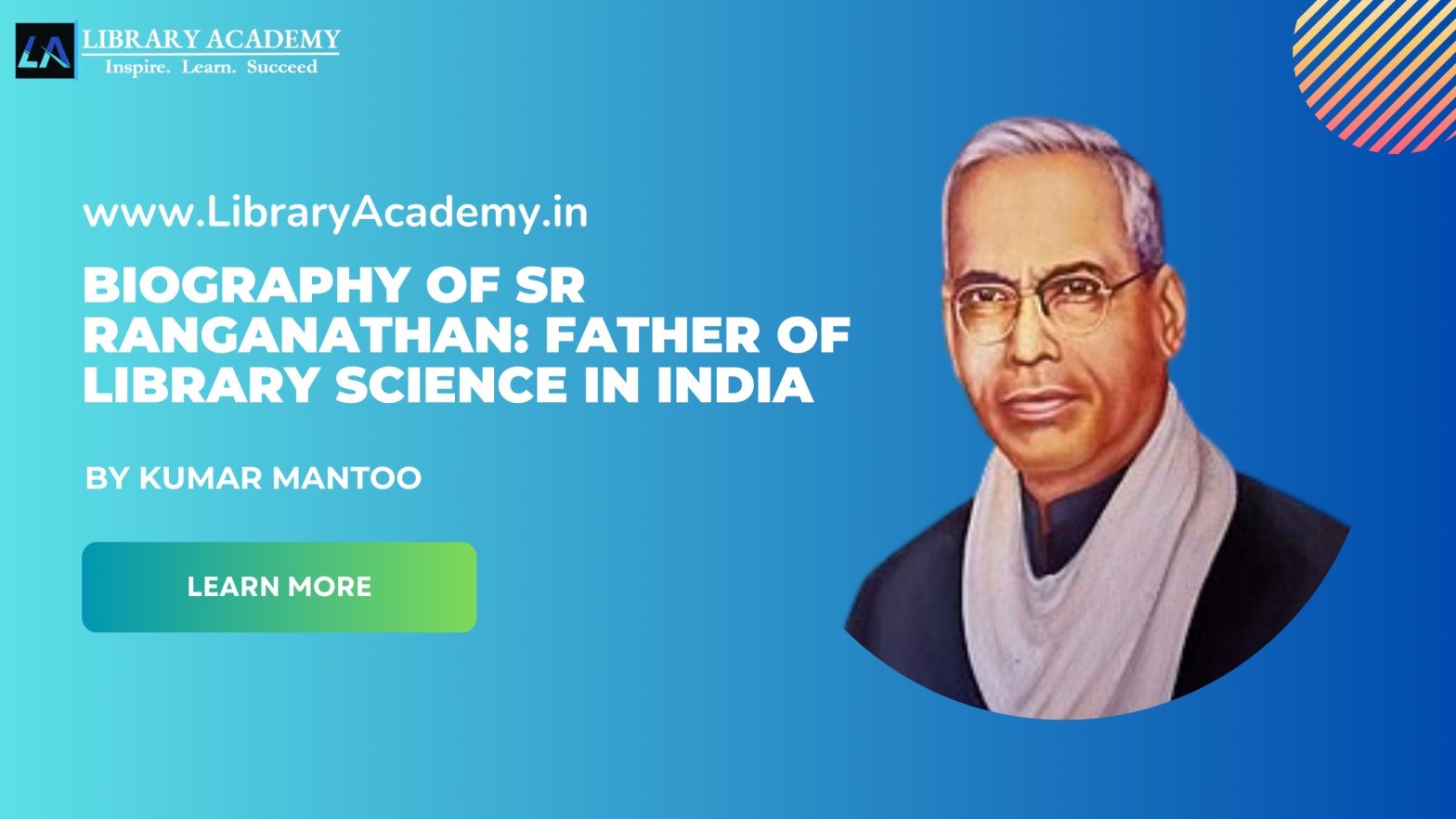Dr. S.R. Ranganathan (1892-1972) was an Indian mathematician and librarian, renowned as the “Father of Library Science in India.” He was a pioneering figure in the field of library and information science. Born on August 9, 1892, in Shiyali, Tamil Nadu, Shiyali Ramamrita Ranganathan made groundbreaking contributions that laid the foundation for modern library science in India and globally.
S. R. Ranganathan Short Information
- Birth: Shiyali Ramamrita Ranganathan was born on August 9, 1892, in Shiyali, Madras Presidency (present-day Tamil Nadu, India).
- Death: He passed away on September 27, 1972, in Bangalore, Mysore State (now Karnataka, India), at the age of 80.
- Career: Ranganathan was a renowned librarian, author, academic, and mathematician.
- Nationality: Indian.
- Awards: Padma Shri (1957), Margaret Mann Citation (1958), Honorary Doctorate.
- Education: Here are the key points regarding S. R. Ranganathan’s education
- Bachelor’s Degree in Mathematics (1913): Ranganathan completed his undergraduate studies in mathematics at Madras Christian College, Madras (now Chennai).
- Master’s Degree in Mathematics (1916): He earned his master’s degree in mathematics from the University of Madras.
- Teaching Career: After completing his education, Ranganathan worked as a mathematics lecturer at various colleges, including Madras Christian College.
- Library Science Education: Ranganathan’s formal education in library science began after he was appointed as the first librarian of the University of Madras in 1924. He went to London to study at the School of Librarianship at University College London.
Early Life and Education of Dr. S.R. Ranganathan
Ranganathan was born on August 9, 1892, in Shiyali (now Sirkazhi), Tamil Nadu, India. He initially pursued a degree in mathematics, earning a Bachelor of Arts and later a Master’s degree from Madras Christian College. His career began as a mathematics lecturer, but his journey into library science started when he was appointed as the first librarian of the University of Madras in 1924.
Contributions to Library Science
Ranganathan’s contributions to library science are vast and impactful. Some of his most notable works include:
1. Five Laws of Library Science (1931): Ranganathan formulated these laws, which have become fundamental principles in the field:
- Books are for use.
- Every reader his or her book.
- Every book its reader.
- Save the time of the reader.
- The library is a growing organism.
These laws emphasize the user-centric nature of libraries and the importance of accessibility and growth in library collections and services.
2. Colon Classification System (1933): Ranganathan developed this faceted classification system, which allows for a more flexible and detailed categorization of library materials. Unlike the Dewey Decimal Classification, the Colon Classification system uses colons to separate different facets of a subject, allowing for more complex subjects to be accurately classified.
3. Library Development in India: Ranganathan played a crucial role in establishing library infrastructure in India. He was instrumental in setting up the Indian Library Association (ILA) in 1933 and the Documentation Research and Training Centre (DRTC) in 1962. His efforts led to the modernization of library science education and the establishment of libraries across the country.
4. Prolific Writing: Throughout his life, Ranganathan wrote extensively, authoring over 60 books and numerous research papers. His writings covered various aspects of library science, including cataloging, classification, library administration, and library education.
Here is the list of notable works by S.R. Ranganathan in the field of Library Science
- Prolegomena to Library Classification (1937)
- Classified Catalogue Code: With Additional Rules for Dictionary Catalogue Code (1934, 1955)
- The Five Laws of Library Science (1931)
- Colon Classification (1933)
- Library Administration (1935)
- Library Manual for Library Authorities, Librarians, and Library Workers (1935)
- Indian Library Manifesto (1938)
- Headings and Canons; Comparative Study of Five Catalogue Codes (1955)
- Classification and Communication (1951)
- Ramanujan: the Man and the Mathematician (1967)
S. R. Ranganathan received prestigious awards
S. R. Ranganathan received several prestigious awards in recognition of his contributions to library science and information organization. Some of the key awards include:
- Padma Shri (1957): One of India’s highest civilian honors, awarded by the Government of India for his significant contributions to library science.
- Margaret Mann Citation (1958): Awarded by the American Library Association for his contributions to cataloging and classification.
- Honorary Doctorate: Several universities, including the University of Delhi, honored him with honorary doctorates for his pioneering work in the field.
Ranganathan’s work, especially his development of the Five Laws of Library Science and the Colon Classification system, earned him international recognition and cemented his legacy as the father of library science in India.
Later Life and Legacy
Ranganathan’s work earned him international recognition. He was invited to teach and lecture at several prestigious institutions around the world. His influence extended far beyond India, contributing to the global development of library science.
He passed away on September 27, 1972, but his legacy lives on through the principles and systems he developed, which continue to be integral to library science today.
In recognition of his contributions, August 12, the day of his birth, is celebrated as National Librarians’ Day in India.
Ranganathan’s work transformed the way libraries operate, making them more accessible, efficient, and user-focused. His vision of the library as a dynamic, growing entity has had a lasting impact on the field of library and information science.
Sources
- Satija, M. P. (2019). The Five Laws of Library Science: Foundations, Interpreted, and Applied. Chandos Publishing.
- Sharma, Pandey S.K. (1989). S.R. Ranganathan: a Multidimensional Personality. Ess Ess Publications.
 Subscribe YouTube Channel
Subscribe YouTube Channel


1 thought on “Biography of SR Ranganathan: Father of Library Science in India”
Comments are closed.